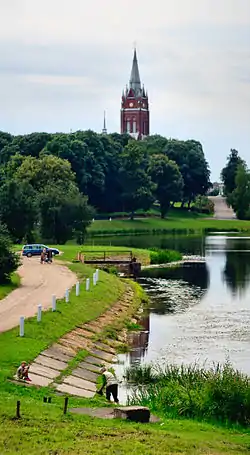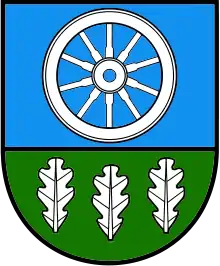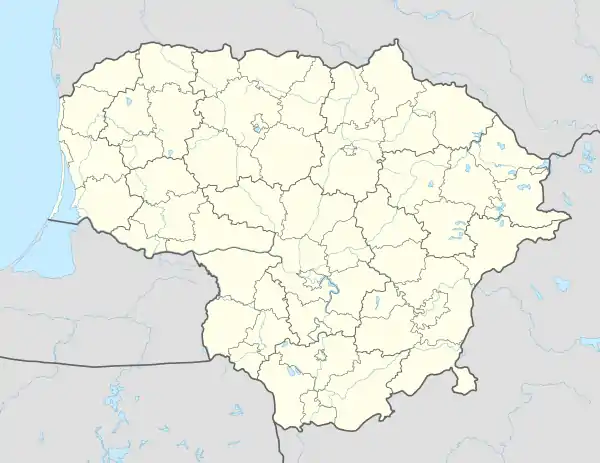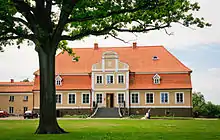Kelmė
Kelmė (![]() pronunciation ; is a city in northwestern Lithuania, a historical region of Samogitia. It has a population of 8,206 and is the administrative center of the Kelmė district municipality.
pronunciation ; is a city in northwestern Lithuania, a historical region of Samogitia. It has a population of 8,206 and is the administrative center of the Kelmė district municipality.
Kelmė | |
|---|---|
City | |
 Church of Kelmė | |
 Flag  Coat of arms | |
 Kelmė Location of Kelmė | |
| Coordinates: 55°38′0″N 22°56′0″E | |
| Country | |
| Ethnographic region | Samogitia |
| County | Šiauliai County |
| Municipality | Kelmė district municipality |
| Eldership | Kelmė eldership |
| Capital of | Kelmė district municipality Kelmė eldership |
| First mentioned | 1484 |
| Granted city rights | 1947 |
| Government | |
| • Mayor | Vaclovas Andrulis |
| Area | |
| • Total | 7.85 km2 (3.03 sq mi) |
| Elevation | 128 m (420 ft) |
| Population (2017) | |
| • Total | 8.245 |
| • Density | 1.1/km2 (2.7/sq mi) |
| Time zone | UTC+2 (EET) |
| • Summer (DST) | UTC+3 (EEST) |
| Website | Official website |
History
Kelmė's name may come from the Lithuanian "Kelmynės", literally "the stubby place" because of the forests that were there at the time of its founding.[1]
Kelmė was first mentioned in 1416, the year that Kelmė's first church was built.[1]
Prior to World War II, Kelmė (Yiddish: Kelm) was home to a famous Rabbinical College, the Kelm Talmud Torah.
According to an 1897 census, 2,710 of Kelme's 3,914 inhabitants were members of the town's Jewish population, the vast majority of whom were merchants and traders and lived in the town.
Most of the Jews in Kelmė rural district were murdered during a mass execution on July 29, 1941. On August 22 a second mass execution occurred. On October 2, 1941, some Kelmė and Vaiguva Jews were murdered in Žagarė. The executions were committed by Lithuanians nazis, auxiliary police and Germans soldiers.[2] In total, the number of victims is 1250-1300 people.
Gallery
 Kelmė Manor, dates to the 15th century
Kelmė Manor, dates to the 15th century Kelmė Manor gates and church in the distance
Kelmė Manor gates and church in the distance Evangelical Reformed Church, built in 1615
Evangelical Reformed Church, built in 1615
 Kelmė Jonas Graičiūnas Gymnasium
Kelmė Jonas Graičiūnas Gymnasium Municipality building
Municipality building
People
- Antanas Mackevičius[1]
- Bronius Laucevičius-Vargšas (1884–1916), writer.
- Aryeh Leib Frumkin, Rabbi
- Icchokas Meras, writer
- Zvi Yaakov Oppenheim, Rabbi 1883–1926
- Simcha Zissel Ziv, the Alter of Kelm
Twin towns
Kelmė is twinned with:
| City | COA | Country |
|---|---|---|
| Biłgoraj | ||
| Hódmezővásárhely | ||
| Egerszalók |
References
- "Kelmė". Kelmė. Retrieved 3 June 2014.
- http://www.holocaustatlas.lt/EN/#a_atlas/search/vcntfr=1000.vcntto=5000/page/3/item/216/

